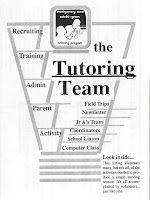The first program is now Tutoring Chicago. I led it from 1975 to 1992 while it was hosted at the Montgomery Ward Headquarters in Chicago. When I took the lead (as a volunteer) in 1975 we had 100 pairs of elementary school kids and adult volunteers, mostly Montgomery Ward corporate office employees. By 1992 when I left, we had converted the program (in 1990) to a non-profit called Cabrini Green Tutoring Program, Inc, and our number of kids served was 440 2nd to 6th grade kids and 550 volunteers, who came from more than 100 different companies in the Chicago region.
In October 1992 I left that program and with the help of six volunteers, created a new program, called Cabrini Connections, to help kids who aged out of the first program after 6th grade, have continuous adult tutor/mentor support through high school.
We started with 7 volunteers and five teens in January 1993 and by 1998 we had nearly 100 volunteers serving 80 teens. Due to space limitations we kept the number of kids served each year at around 80 until I left the program in 2011. The greater number of volunteers was the result of volunteers leading extra learning activities such as our arts, video and technology clubs, as well as serving as substitutes and in other roles. (The name of the program was changed to Chicago Tutoring Connection after 2011. This is the Facebook page.)
When we launched Cabrini Connections to serve kids in the Cabrini Green area of Chicago, we also launched the Tutor/Mentor Connection to help similar programs grow in all parts of Chicago. I still lead that, via Tutor/Mentor Institute, LLC. This blog is one of the ways I continue to try to help youth tutor, mentor and learning programs grow in Chicago, and around the world.
I've often been asked to talk at mentor training events, and while I do that, I don't consider myself an expert. What I focus on is "How leaders build and sustain constantly improving programs over multiple years". Training volunteers to be effective tutors and mentors is certainly part of that process, which is why I organized conferences every six months from 1994 to 2015, to help programs connect and learn from each other.
It's also why the library I host includes "training and learning" materials that can be used by program leaders, volunteers and students.
When I am asked to speak to volunteers I share a strategy that I shared in the programs I led. There are four questions that can provide structure for weekly meetings. These are
1) What was one good thing that you experienced since we last met, and why was that good?
2) What was one bad thing that you experienced? The answer to this question could dominate the rest of the tutoring session.
Note. the volunteer is also expected to answer these questions. It helps build trust and relationships. The questions could be part of writing and journaling activities at the start of every week's tutor/mentor session.
3) What's happening in school? Do you have any tests coming up, or term papers due? Is there homework that you need help with?
Note. We tried to provide volunteers with report cards and case histories so they had some information to guide their planning. The answer given by each student would lead to what they do with their tutor/mentor over the rest of the tutoring session.
4) If the first 3 questions don't stimulate activities for the weekly session, then the final question is "what's going on in the world?" Pull up a newspaper and look at any page. Read an article together and ask "is that important to you?" or "what do you think of this?"
These questions can repeat every week, with different answers each time, because as they say, "life happens". Kids in high poverty areas are exposed to many forms of trauma which often lessens their focus on school and learning. Having someone to help them cope with these issues is really important. It's just as important to have someone share and celebrate the good things, too.
If volunteers end each session with "What will we do next week?" questions, they then have a structure for following sessions. They can say "We talked about this last week" as a lead in to work they have planned. In the programs I led we also had email newsletters to provide an outline for any planned activities for the coming week, such as special speakers, report card review, upcoming writing activities, holiday parties and/or field trips.
In addition, I've been putting archives of program plans from past years in my Google drive. Here's the 1989-90's plan.
Here's the Volunteer Handbook for the 1989-90 Montgomery Ward/Cabrini-Green Tutoring Program. While this is 30 years old some of the tips and guidelines will still apply.
I hope you find these suggestions helpful. Please connect with me and other tutor and/or mentor program leaders and volunteers on Twitter, LinkedIn, Instagram and/or Facebook and build a network of people sharing ideas and helping each other do more to help kids.
Thanks for reading. Have a great weekend.




Thanks for the post, Daniel. The four questions at the end are of super quality. I have saved them and I am wanting to figure out a way to incorporate them into my research, work, and...poetry.
ReplyDeleteThanks for visiting Terry. I'll look forward to seeing what you do with the four questions.
ReplyDelete